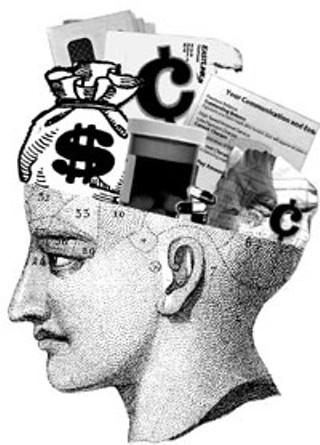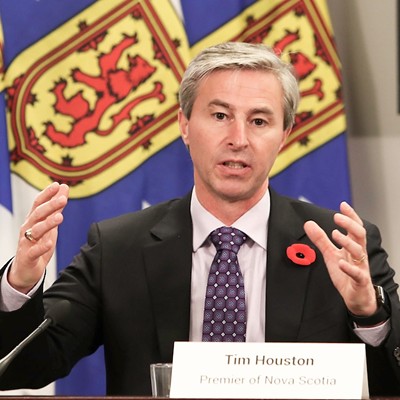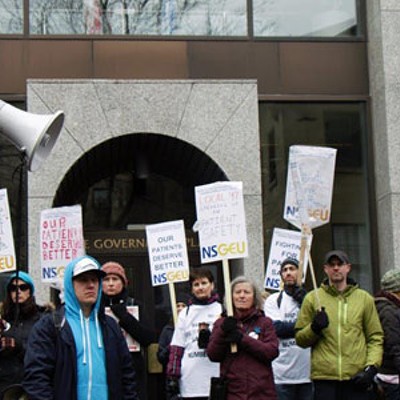It’s Sunday morning and I’m sitting at my computer, paralyzed. To the left of my keyboard is a pile of unopened bills. I’ve been collecting them all week; walking downstairs to the mailbox, picking them up, sorting out the pizza flyers and political campaign brochures, and shuffling everything else—all bills—into a pile that I throw on my desk. All my middle-of-the-month regulars are there: Aliant, Eastlink, Nova Scotia Power. The statement for my student line of credit, the one for my car loan. There’s also an application for interest relief from my Canada student loan.
To the right of my keyboard lies my daybook, flipped open to this weekend. Sunday is circled in red: “Write Coast money/stress article TODAY,” I’ve scrawled, underlined, surrounded with stars.
But today is my first day off in six days; only my second in the past two weeks. I don’t want to spend it thinking about money; I’m stressed out enough as it is. My stomach is already sour from all the coffee I was drinking yesterday at work—trying to take advantage of one of the few perks of working at a cafe—and I know that opening those envelopes will just make my stomach churn faster, force the bile further up my already tight throat. And writing about it? That’s not likely to be much fun either.
I push my chair back and go looking for my wallet. Between what’s left of my tips from this week and some gas money a friend gave me for borrowing my car, I’ve got enough cash for a coffee and a matinee. The bills and the article will wait. I leave.
That is exactly the sort of behaviour that helps get people into financial trouble, or that helps people who are already in trouble stay there, says Jocelyne Brown. She’s got a quick sense of humour and an earthy laugh, and she’s the director of education for the Credit Counselling Service of Atlantic Canada, a non-profit credit counselling agency with 11 offices across Nova Scotia, New Brunswick and Prince Edward Island. The agency gives help to people who are struggling with debt through seminars, one-on-one counselling and, sometimes, acting as intermediaries between debtors and creditors.
“It can be a student debt of $5,000 or a debt of $163,000,” she says when I ask how much people owe before they ask for help. “We see all levels of debts, from all sorts of people. There’s a pre-conception that we deal with lots of low-income people, but that’s not the case; people on social assistance only make up three percent of our clients. We’re helping teachers, nurses, dentists, veterinarians—even bank vice presidents. These are everyday, functioning adults who just can’t get ahead of their debts. We try to help them find their way.”
It turns out that people in my situation—under 30, with a student loan hanging over their heads—are one of the most common types of clients for the credit counsellors at CCSAC, making up a large proportion of the more than 10,000 people who booked appointments with the agency in 2005. Shocked by how small their entry-level paycheques are, frightened by how little is left once rent, bills and loan payments are made, they seek help. Everyone starts in the same place.
“We specialize in one-on-one counselling,” says Brown. “And at that first appointment, we ask two questions: ‘How much do you make?’ and ‘Where does it go?’”
The answers to those questions can be a shock. Although most people know exactly how much goes into their bank account with every paycheque, they have no idea how much they’re spending, and where.
“We tell people to keep track of their daily expenses for 30 to 60 days,” Brown says. “We give them an envelope and tell them to keep every single receipt; if they don’t get a receipt, they have to write the amount down on the envelope. There’s no question about it, it’s a pain in the butt.” But it’s a worthwhile exercise. When they see exactly where their money’s going, “Most people are surprised, but some are out-and-out shocked,” she says. “People are astounded to see that two cups of Tim Horton’s a day can add up to $75 or $100 a month. And when you tell them to consider the 12 Factor—how much they’ll spend in a year—they can’t believe they’re spending $1,200 a year on coffee.”
Once the income and outgo is all accounted for, counsellors help clients prioritize, separating needs from wants and budgeting accordingly. Ultimately, the goal is to try to “budget your way out of the problem,” says Brown. Rent, heat and food are at the top of the list, with paying down debts a close second. Luxuries—whether they’re designer jeans or medium double-doubles—come last, if there’s any money left over.
“The majority of people we see struggling with student loan debts are able to devise a budget that works for them,” says Brown. “But if they can’t, then we investigate other measures,” such as applying for interest relief from student loans. That’s a temporary measure, but it’s one that might help you survive while you work to get other aspects of your finances under control. The point to remember is that with careful planning, it’s possible to get out from under your debt load.
“You need to tell yourself ‘I can gain control,’” Brown says. “Regardless of your finances, you can have control. And the biggest tool at your disposal is managing your expenses.”
In other words, think before you spend. Remember that spending more in order to save more—like with a phone/television/internet/ long distance bundle—can sometimes be a false economy. If you’re going to borrow, consider the actual cost of borrowing (how much are you going to pay in interest?), not just the fact that you’re going to be able to “Ho-ho-hold the payments.” Stay away from high-interest rate credit cards. Work to stay within your means. “It’s as simple as this,” Brown says. “If you don’t have the money, don’t spend it.”
It sounds easy enough when she puts it like that, but taking control of your finances is just like making any other lifestyle change. It takes conscious will and constant effort. “If your New Year’s resolution was to lose weight and get fit, but you’ve been eating junk food for 16 years without getting off the couch, it’s going to be really difficult,” says Brown. “And taking control of your finances is exactly the same. You’ll have to work hard, every day, to control your spending, just like you’d have to control what you ate and how much exercise you got, but you can do it. You can be in control. And it will feel great.”
















